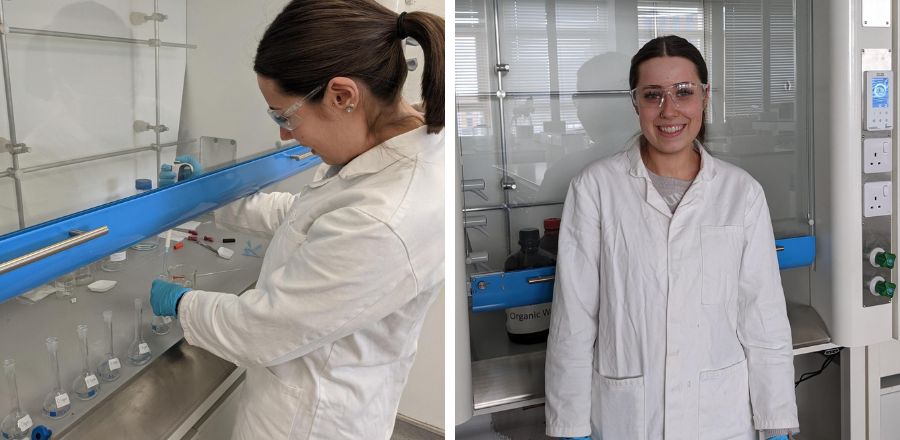Student reflects on the importance of role models on International Day of Women and Girls in Science

A Forensic Investigation student has spoken of the importance of role models in inspiring young girls to pursue a career in STEM, as part of the International Day of Women and Girls in Science.
The International Day of Women and Girls in Science (February 11) is an annual celebration adopted by the United Nations General Assembly to promote the full and equal access and participation of females in Science, Technology, Engineering and Mathematics fields.
This year, the day focuses on how science and gender equality are both vital for the achievement of the internationally agreed development goals, including the 2030 Agenda for Sustainable Development.
As part of her course, Fourth year Forensic Investigation student Sophie Gilmour has studied environmental forensics and chemistry, which looks at eradicating the environmental impact of climate change and how it affects vulnerable countries. She said: “In my course, we have taken a few modules in environmental forensics and chemistry which looks at eradicating environmental issues caused by events in the past, including things like coal mines, pesticides and pollution from large companies. The focus for us is to make a difference now, because we can’t go back and change what happened in the past.
We look at things like soil mediation and waste water treatments, which currently affects developing countries in a much larger way. There’s been examples of how these factors can affect communities and those who live in them, for example certain metals being found in water supplies which affected children and their health into adulthood. We’re looking into how we can change that and I believe it’s really important in helping these developing countries, as well as our own.”
With this year’s focus on the achievement of the international agreed Sustainable Development Goals (SDGs), the need for gender equality has become more significant than ever. Now at the end of her Undergraduate degree, Sophie has reflected on those who encouraged her to pursue a serious career in science; which she believes to be the key to improving gender equality in scientific fields.
Sophie explained: “When I started high school and began making my subject choices, I chose chemistry and biology and continued to do them both at an advanced level later on. I noticed early on that I was naturally drawn to science, because I understood and genuinely enjoyed studying it.
My chemistry teacher was the head of our department in my school and he had a massive impact on me personally becoming interested in science. In my year at school, there wasn’t a lot of girls choosing to study science at a higher level – most decided to stop doing it once they got to a certain level. Our chemistry teacher however was incredibly passionate and enthusiastic about the different sciences – it was infectious.
I’m also a big fan of true crime, and with chemistry being such a diverse subject, I wanted to specialize in something and forensics was a great option for me. It was a really up and coming area and that’s what helped me choose to study it in university.”
Looking back at her early influences, Sophie owes a lot of thanks to her male chemistry teacher; who’s attitude towards gender equality and inclusiveness helped her realise her potential as a young scientist. She said: “It was especially important to me that my chemistry teacher was a man; he wasn’t trying to push anyone to choose a particular subject because of their gender, e.g encouraging girls to choose biology rather than chemistry or physics.
He simply wanted to help everyone feel his passion towards science in general and pass it on to anyone – no matter who you were or how good you were at something. For me, that was kind of the only reason that I became so interested in the subject and it’s important that you choose something that you’re good at, not necessarily just because of the money. He really did help drive me to where I am today.”
Now looking to move into a scientific teaching profession, Sophie wants to continue in helping young people consider sciences as a viable career option – no matter their gender or background. Sophie explained: “Days like International Day of Women and Girls in Science are so important, especially for young girls in school. Science subjects at university level can be seen as ‘too difficult’ and still to this day is more of a male-dominated area overall.
I recently read something that explained that many pupils are choosing to study a science up to a National 5 level, but aren’t as likely to choose it at a level more advanced than that. In the context of research and PhDs, it’s still largely male dominated and we need early influence to ensure that more women are looking at science as a serious career route.”
She added: “When I was in high school, I never would have imagined myself doing a science degree at university. We need to highlight that there shouldn’t be an indifference; I can do the same as what a boy could do in science. It’s especially important to raise awareness of that to people at such a young age especially in a secondary school setting where it could help someone choose to study science at a higher level."
Find out more about women in STEM on the Glasgow Caledonian University website
By Rachael McAlonan
Got a SCEBE or GSBS story? Email me at Rachael.McAlonan@gcu.ac.uk or connect with me on social media here
